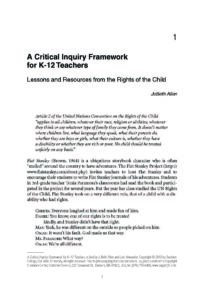Author: JoBeth Allen and Lois Alexander
Summary: This sample book chapter explains what teacher-led critical inquiry means in a social justice context. Useful in planning inquiry groups with a social justice focus, it also includes excellent content to help teachers to bring a social justice focus to their individual inquiry practice and encourage their students to take a critical inquiry stance in the classroom.
Original Date of Publication: January 24, 2013
Excerpt
The Articles of the Convention on the Rights of the Child provide positive statements of what a just society ensures for its children. The Articles directly address issues that critical educators often use as the basis for inquiry such as the right of the child to his or her views (Article 13) and the right to learn about and practice their own culture, language, and religion (Article 30). The UN General Assembly unanimously adopted the Convention on the Rights of the Child on November 20, 1989, and it became legally binding in September 1990. All countries have now ratified it except for Somalia and the United States (http://www.unicef.org/crc/index_30197.html).
Critical inquiry into the Rights of the Child (ROC) operated at two levels for us. First, the teachers in this book are all teacher consultants with the Red Clay Writing Project. We formed a study group that explored the ROC and became allies with our students in advocating for students’ own rights to free speech and to social criticism. One would think these would be inalienable rights, but there are countless examples to the contrary (Apple, 2009). Second, our students studied the rights of children as set forth in the Articles of the Rights of the Child as integral parts of the language arts and social studies curriculum standards. In this book we 1) demonstrate the applicability for critical educators of a critical content framework; 2) offer invitations to seven classroom inquiries based on pertinent Articles in the Right of the Child (see Table 1.1 at the end of the chapter); 3) detail adaptable processes for engaging students and families in critical inquiry; and 4) provide an extensive annotated bibliography of children’s literature that can support critical inquiry.
In this chapter, we’ll explain what “critical inquiry” came to mean for us and for our students in terms of critical stance, critical literacy, and critical questioning. We’ll share the influence of critical researchers and educators who focused us on literacy and social class, and the story of how Rebeccah Williams Wall and her students led us to the UN Convention on the Rights of the Child. Finally, in the spirit of examining multiple perspectives, we address some of the controversy surrounding the Rights of the Child.
Original Source: National Writing Project, http://www.nwp.org/cs/public/print/resource/4039
